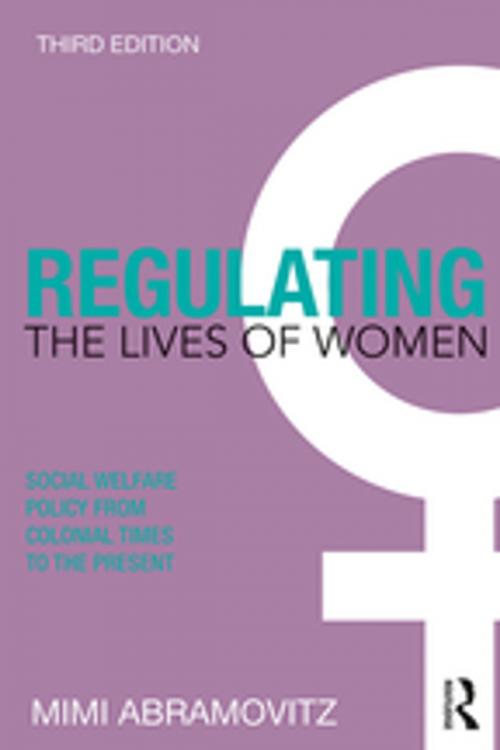Regulating the Lives of Women
Social Welfare Policy from Colonial Times to the Present
Nonfiction, Social & Cultural Studies, Social Science, Gender Studies| Author: | Mimi Abramovitz | ISBN: | 9781351855273 |
| Publisher: | Taylor and Francis | Publication: | August 23, 2017 |
| Imprint: | Routledge | Language: | English |
| Author: | Mimi Abramovitz |
| ISBN: | 9781351855273 |
| Publisher: | Taylor and Francis |
| Publication: | August 23, 2017 |
| Imprint: | Routledge |
| Language: | English |
Widely praised as an outstanding contribution to social welfare and feminist scholarship, Regulating the Lives of Women (1988, 1996) was one of the first books to apply a race and gender lens to the U.S. welfare state. The first two editions successfully exposed how myths and stereotypes built into welfare state rules and regulations define women as "deserving" or "undeserving" of aid depending on their race, class, gender, and marital status. Based on considerable new research, the preface to this third edition explains the rise of Neoliberal policies in the mid-1970s, the strategies deployed since then to dismantle the welfare state, and the impact of this sea change on women and the welfare state after 1996. Published upon the twentieth anniversary of "welfare reform," Regulating the Lives of Women offers a timely reminder that public policy continues to punish poor women, especially single mothers-of-color for departing from prescribed wife and mother roles.
The book will appeal to undergraduate, graduate, and postgraduate students of social work, sociology, history, public policy, political science, and women, gender, and black studies – as well as today’s researchers and activists.
Widely praised as an outstanding contribution to social welfare and feminist scholarship, Regulating the Lives of Women (1988, 1996) was one of the first books to apply a race and gender lens to the U.S. welfare state. The first two editions successfully exposed how myths and stereotypes built into welfare state rules and regulations define women as "deserving" or "undeserving" of aid depending on their race, class, gender, and marital status. Based on considerable new research, the preface to this third edition explains the rise of Neoliberal policies in the mid-1970s, the strategies deployed since then to dismantle the welfare state, and the impact of this sea change on women and the welfare state after 1996. Published upon the twentieth anniversary of "welfare reform," Regulating the Lives of Women offers a timely reminder that public policy continues to punish poor women, especially single mothers-of-color for departing from prescribed wife and mother roles.
The book will appeal to undergraduate, graduate, and postgraduate students of social work, sociology, history, public policy, political science, and women, gender, and black studies – as well as today’s researchers and activists.















